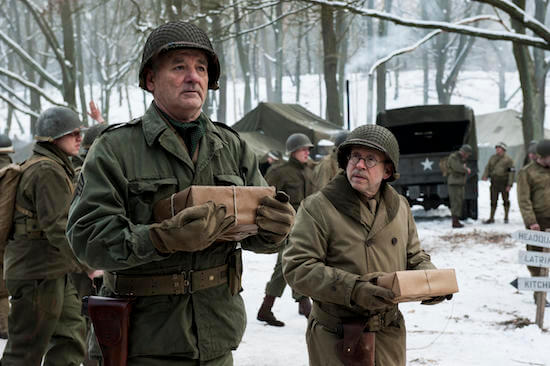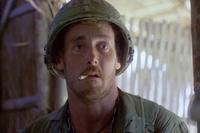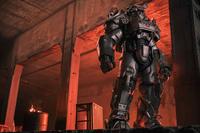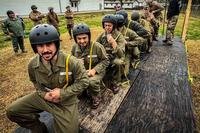
The chemistry between actors Bob Balaban and Bill Murray provides some of the nicest comic moments in director George Clooney's The Monuments Men. Clooney and co-writer Grant Heslov have made a movie that's serious about the subject of protecting the arts and culture during wartime, but they've wrapped the whole thing in an old-school Big Hollywood picture that aims to entertain. Think Oceans 14 with Nazis as the enemy instead of casino owners.
All of the characters in the movie are loosely based on the real individuals whose stories appear in Robert Edsel's The Monuments Men book. Balaban's Preston Savitz character is inspired by Lincoln Kirstein, a New York cultural legend who founded the New York City Ballet after his World War II service. Balaban's had a long career in movies, starting with Catch 22 and continuing through the Christopher Guest improv comedies (including Best in Show and A Mighty Wind), Gosford Park, Ghost World and, recently, Moonrise Kingdom. He also had a recurring role on Seinfeld.

Bob talked to Military.com about the movie and how he prepared for his role.
This seems like a real Old Hollywood take on a war movie, like a throwback to the ‘50s and ‘60s.
Well, it's interesting. The first thing that I was in was a World War II movie: Catch-22. It was about World War II. I was 22 years old and spent eight months on the film. In this case, it was only five and a half months in Germany, away from home, living in an insanely rarified environment – in both cases, actually.
Well, in the first one, Catch-22, was in Guaymas, Mexico, a population of like three. And we were all staying in one hotel together: Orson Welles, Bob Newhart, me, Anthony Perkins, Art Garfunkel. It was the most amazing assortment of people. For The Monuments Men, it was also an amazing assortment of people, but we were in a big city much of the time.
George wanted to make a very particular kind of movie, which I think seems to be a really good idea from having seen the movie. He wants this movie to get seen by a lot of people. It's very hard to make a movie that involves, even sparingly and very fleetingly, the Holocaust.
And our ears tend to get deadened to the sound of not just World War II, but Germany and Nazis. How many times can we put ourselves through this experience, seeing what we imagine will be horrible, scary, really awful things? So I think George very consciously made a popular movie out of what could have been a very elite topic. Everybody's heard of The Mona Lisa and everybody has heard of The Last Supper, but not everybody cares about it as a topic. And he's made what should be a very popular movie that I hope helps more people to know about what happened.
There isn't all that much left about World War II that has gone untouched. This has been, fleetingly touched on in The Train and a couple of other movies, but mostly it's a pretty off the beaten track area and it's really important. So I think George set out to make a popular movie and consciously make a movie that felt like a good old kind of World War II movie that we hadn't seen in a really long time.

What the Monuments Men did in World War II seems like an exception to how the military has responded to art and culture during wartime.
Well, you would think it's kind of like oil and water. One of the smart things about it is the characters in the movie understand that this is going to be not looked upon by other people as important. There are millions and millions of lives being lost here. How can you compare that to the loss of art? Well, you can’t, because they're different. Nobody is saying one is less important or more important that the other. The movie is just saying it's important. And I think the film has done its job very well at making you understand that it's not just paintings. It's the ability of one despot, Hitler, to not only kill 20 million people but to almost effectively eradicate their cultural impact and imprint.
I had no idea that the art was in such danger right up until that moment at the end of the war where the Allies realized that this art was hiding in these salt mines. I didn’t know that Hitler had issued an order to destroy it all that was inches away from being 100 percent effective. We could have had no European and Jewish culture. It's really a terrifying thought. I think George was able to find a way to make an entertainment that allowed you to experience the importance of it.
Did you do much research into the real person who inspired your character?
I didn’t. In the beginning, I wanted to, but one I realized that our characters were amalgams of people, I decided that it was only important that I have something specific in mind as to what kind of person this person was and that he came from a certain kind of New York world. I didn’t know Lincoln Kirstein. I think he was dead before I was old enough to possibly meet him, but I certainly knew a lot of people like him. But I didn’t want my character to be specifically based on him because many of his key characteristics weren't necessarily written into my part of the movie.
One of the things I did other than reading Robert Edsel's book was read something that Robert gave me, a book of poetry that my Kirstein wrote. That really was more of an insight into his character and personality than any other biographical material that I could have seen. His actual poems, what he was thinking about. That to me was the most interesting piece of research that I was able to do. Just by sheer luck he gave me the book.

You and Bill Murray have great chemistry together in this movie.
Well, I'm glad to hear it. Good. I've worked with him in Moonrise Kingdom, which was last year. And we didn’t really, you know, work together,: but we were there at the same time and my character as the narrator actually appeared in the story at one point when Bill was having a fight with Bruce Willis. But we hung around a little tiny, tiny bit, and we've known of each other for 35 years, just little moments here meeting here and there.
His kids used to read my children's books. I write kids books. I've always really liked him, always really admired him, but never before got to spend the kind of time you spend with somebody on a movie of this duration in some exotic locations. You get to know your fellow actors much better when you're not in a big city. When you're in Berlin, nobody needs to band together and huddle for the warmth and some real company, because Berlin is like the most fascinating city you could imagine.
During the course of this thing to get to know a lot of people, Bill more than some of the other people, because we were working together more. I hope I get to work with him again because he's unique and very, very special. And I learned a huge amount. And also it made me happy to be around him.




